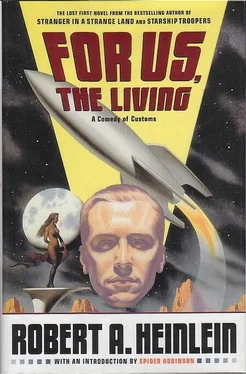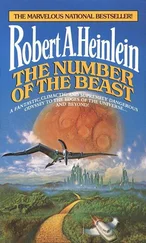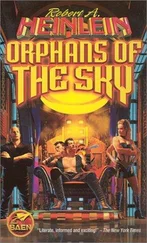Robert Heinlein - For Us, The Living
Здесь есть возможность читать онлайн «Robert Heinlein - For Us, The Living» весь текст электронной книги совершенно бесплатно (целиком полную версию без сокращений). В некоторых случаях можно слушать аудио, скачать через торрент в формате fb2 и присутствует краткое содержание. Жанр: Фантастика и фэнтези, на английском языке. Описание произведения, (предисловие) а так же отзывы посетителей доступны на портале библиотеки ЛибКат.
- Название:For Us, The Living
- Автор:
- Жанр:
- Год:неизвестен
- ISBN:нет данных
- Рейтинг книги:3 / 5. Голосов: 1
-
Избранное:Добавить в избранное
- Отзывы:
-
Ваша оценка:
- 60
- 1
- 2
- 3
- 4
- 5
For Us, The Living: краткое содержание, описание и аннотация
Предлагаем к чтению аннотацию, описание, краткое содержание или предисловие (зависит от того, что написал сам автор книги «For Us, The Living»). Если вы не нашли необходимую информацию о книге — напишите в комментариях, мы постараемся отыскать её.
For Us, The Living — читать онлайн бесплатно полную книгу (весь текст) целиком
Ниже представлен текст книги, разбитый по страницам. Система сохранения места последней прочитанной страницы, позволяет с удобством читать онлайн бесплатно книгу «For Us, The Living», без необходимости каждый раз заново искать на чём Вы остановились. Поставьте закладку, и сможете в любой момент перейти на страницу, на которой закончили чтение.
Интервал:
Закладка:
When the pilot was satisfied with his combination, Perry ventured to speak. "Excuse me." The pilot glanced back and his grimness relaxed a trifle.
"Oh, it's you. I'd forgotten you were here. Want something?"
"Just one thing. Why are all your controls double?"
"As a matter of fact they are quadruple, in parallel-series around each pilot's chair. I suppose you mean why the pinch-buttons."
"Yes, why not ordinary push buttons?"
"Each side is an ordinary push button, but you have to pinch a pair with thumb and forefinger to cause any action. Look." He ran his finger along the key board, pressing a dozen or more keys. Nothing happened. "It's a safety device against freezing on the keyboard at high acceleration. I could pass out and fall face down on the keyboard and never set off a jet. My partner could then land by squeezing the keys on his board. For example, if we had ordinary push buttons and I pressed the combination for maximum breaking, I'd be pushed hard upon the board by my own momentum, and I might not be able to release the controls. With this system I have to will to pinch or nothing happens."
"Thanks. Say, how long does it take to learn to be a rocket pilot?"
The pilot looked at him curiously but answered his question. "If you are temperamentally fitted, three months should do. There is always more to learn."
The stewardess stuck in her head. "Ready for your tea, Skipper? And you, Jack?" The navigator gave a taciturn nod. The skipper assented, and said to Perry, "I think you'd better have your tea in the passenger compartment."
Perry unstrapped himself and returned to Cathcart, who nodded greeting. "See what you wanted to?"
"Yes, and was dismissed most diplomatically."
Sandwiches, tea, and little cakes brought on sleep. Perry was awakened by the deceleration warning as they circled over Washington. Perry stared out. Here was a place which time had not changed beyond recognition. The Potomac and the tidal basin were below. There stood the Washington Monument and Lincoln still stared into the reflecting pool. The White House still sprawled among the budding trees, serene and cool. And on Capitol Hill the ponderous Greco-Roman majesty of the Capitol still stood, far-flung, solid, and enduring. He choked and sudden tears came to his eyes.
The visit to Washington was amusing but without special incident. The constitutional changes were not apparent on the surface. The city was changed in many details, but the landmarks remained. The streets were unroofed, and, in the absence of surface traffic, constituted popular promenades and lounging places. Perry wandered about them and visited the museums and art galleries. He spent one afternoon in the gallery of the House listening without much interest to the debate Cathcart had come to hear. The president had directed the building of a fleet of fast, unarmed, long-radii patrol vessels, both air and surface, to maintain a constant patrol from the Aleutians through Hawaii and down to Ecuador, and ear-marked a portion of the dividend for that purpose. The President's plan was practically unopposed, but one group wished to enlarge it with a new issue of money to provide more heavy armored short radii rockets for coast defense. The debate dragged on and a compromise seemed likely. As Perry was no longer in the navy this didn't interest him much, especially as the type of armament proposed was obviously unsuited for foreign war. He concluded that the American people were both determined not to fight and determined to let the whole world know that they were prepared to resist invasion.
That night at dinner at the New Mayflower, Cathcart asked him what impressed him most about the Capitol. Perry replied that it was the Congressmen, and explained that they appeared to be a much more able body of men than was commonly reputed to be the case in 1939. Cathcart nodded.
"That was probably the case," he said. "If you got good elective officials in your day, it was a happy accident, better than you deserved."
"To what do you attribute the change?" asked Perry.
"To a number of things. To my mind there is no single answer. The problem involved is the very heart of the political problem and has been plaguing philosophers for thousands of years. Plato and Confucius each took a crack at it and each missed it by a mile. Aesop stated it sardonically in the fable of the convention of the mice, when he inquired gently, 'Who is to bell the cat?'. The present improvement over your period can, I think, be attributed to correcting a number of things which were obviously wrong without worrying too much about theory. In the first place all of our elective officials are well paid nowadays and most of them have full retirement. In the second place, every official makes a full statement of his personal finances on taking office, annually, and again on leaving office. In the third place, public service has gradually been built up as a career of honor, like the military and naval services in your day. A scholarship to the School of Social Science is as sought after as an appointment to West Point was in 1939. Most of our undersecretaries and executives of every sort are graduates. They are recruited for they have the same reputation for efficiency and incorruptability that your West Pointers and Annapolis men have always had.
"Of course you can't teach creative policy making in a school. The top men still come from everywhere. Our complete system of social security makes it possible for any man with a taste for it to enter politics, and several arbitrary changes in the code of customs have encouraged them to do so. Campaign funds and permissible types of campaigning are now restricted enormously, a degree of change comparable to the difference between your day and the elections at the beginning of the nineteenth century when a man announced his vote to a teller at the polls whereupon the favored candidate shook hands with him and gave him a drink of whiskey. Nowadays our object is to ensure that each voter has a chance to know the record, appearance and proposals of each candidate. They must use the franking privilege jointly. They must go on the air together, they must refrain from certain forms of emotional campaigning. The people are better able to judge than they were in 1939 because of the improvement in our educational methods. They are not as subject to word magic, not so easily spellbound.
"Possibly the most important change that has improved the chances of obtaining honesty and efficiency in government was the extension of civil rights after the defeat of the Neo-Puritans. You will recall the new constitutional principle that forbade the state to pass laws forbidding citizens to commit acts which did not in fact damage other citizens. Well, that meant the end of the blue laws, and a grisly unconscious symbiosis between the underworld and the organized churches—for the greatest bulwark of the underworld were always the moral creeds of the churches. You still think that unlikely? Consider this: The churches had great political power. It was almost impossible to be elected to office if the churches disapproved. It is a matter of fact, easily checked, that every public leader of every corrupt political machine was invariably a prominent member of a large, powerful sect. He always contributed heavily to the church, especially to its charities. On the other hand every church stood publicly for honesty in government. At the same time they demanded of the government that there be suppressed all manner of acts, harmless in themselves, but offensive to the creeds of the churches. Churches and the clergy were usually willing to accept the word for the deed. Protestations of integrity, combined with tithing and psalm singing, plus a willingness to enact into law the prejudices of the churches, were usually all that the churches required of a candidate. On the other hand the gang leaders were hardened realists. They cared nothing about a candidate's appearance of pious virtue if he could be depended on to protect from prosecution the gang that supported him. Furthermore they were anxious to have blue laws on the books as long as they were not enforced. Illicitness was the thing that made most of their stock in trade valuable, and they knew it. Where in your 1930's was there a gang leader who urged repeal of the eighteenth amendment? The very blue laws they broke gave them a weapon to destroy competition, for the same machine which gave them protection could be used to destroy an enemy who did not own a piece of the local government. And so it went for years, in every large American city, the gangsters and the preachers, each for his own purpose, supported and elected the same candidates. It was inevitable, because the churches demanded of government things that government cannot or should not perform—things that come under the head of making a man be 'good' for the good of his soul, instead of interfering only to prevent him damaging another. The churches had a thousand rationalizations to prove that their nosey-parker interference was necessary for the welfare of all.
Читать дальшеИнтервал:
Закладка:
Похожие книги на «For Us, The Living»
Представляем Вашему вниманию похожие книги на «For Us, The Living» списком для выбора. Мы отобрали схожую по названию и смыслу литературу в надежде предоставить читателям больше вариантов отыскать новые, интересные, ещё непрочитанные произведения.
Обсуждение, отзывы о книге «For Us, The Living» и просто собственные мнения читателей. Оставьте ваши комментарии, напишите, что Вы думаете о произведении, его смысле или главных героях. Укажите что конкретно понравилось, а что нет, и почему Вы так считаете.












